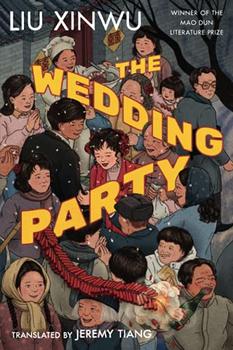Summary | Excerpt | Reviews | Beyond the book | Read-Alikes | Genres & Themes | Author Bio

Within the general arc of many well-established and chronicled historical events is oral history's wonderful ability to home in on nuances, illuminating particular situations and personalities that perhaps couldn't find room in other tellings, but come alive here. Studs Terkel accomplished this with the Great Depression and World War II. Svetlana Alexievich has shined much-needed light on World War II from Russia's perspective, as well as Chernobyl and the country's post-Soviet Union life. And there have been other great oral history accounts relating to television, genres of music, world events, slavery and Reconstruction, and so much more.
The challenge of fictional oral history is to make it feel convincing enough that it coheres with the established historical record. Taylor Jenkins Reid achieved this with the faux music biography Daisy Jones & The Six (2019). While the band it describes bears similarities to Fleetwood Mac, the novel was very much its own towering foray into rock 'n' roll history.
The Final Revival of Opal & Nev, Dawnie Walton's first novel (and may there be dozens more), lifts off under its own majestic, creative power, and quickly achieves a spectacular altitude. It takes the form of an oral history book curated by prominent music journalist and editor Sunny Curtis, who has a tragic connection to Opal Jewel, one half of the revered and controversial '70s duo Opal & Nev. Her father, respected drummer Jimmy Curtis, had an affair with Opal while married to Sunny's mother. Before his daughter was born, Jimmy was murdered during a racially-motivated riot at the ill-fated Rivington All-Star Showcase concert in New York. Sunny's professional success can be partly attributed to Opal, who paid for her education all the way through her master's degree in journalism.
Opal never expected to become a singer, let alone a famous one, firmly believing that her half-sister, Pearl, would be the one to achieve stardom with her voice. In fact, when English singer-songwriter Nev Charles comes to Detroit as part of a record company-backed tour to look for a Black singer to partner with him, Opal thinks that Nev must be there to hear Pearl. Nev's interest in Opal leads to some friction between the sisters because, as Pearl explains, she asked him, "Are you kidding?" only because she "wanted to know if he was on the up-and-up, because people could be so cruel to Opal." In hindsight, Opal is grateful to Pearl for having said that to Nev, but back then she believed that Pearl was expressing disbelief that her sister's talent was being recognized over her own.
So begins Opal's whirlwind career as she looks to define herself as a singer, define her personal style (as Curtis explains in a footnote, Opal has "a form of alopecia areata," in which hair drops away from the scalp, and she is essentially bald, so this involves a lot of hats and scarves), along with what she believes in and what she wants to fight for, particularly in a social environment where an interracial singing duo in America can be a powder keg. And that powder keg explodes after the Rivington Showcase concert is hastily planned and all warning signs emanating from the dangerous country music group the Bond Brothers are ignored by a record label bigwig whose avarice overrides concerns about safety. This is the tragic centerpiece and core of the novel, and the different perspectives of the event expressed to Curtis are hard to bear. However, the incident produces a necessary subtle wake-up call to readers to look into our minds and hearts and really examine who we are and how our attitudes and behavior have changed, or not, since the 1970s. What do we believe? Is it true? Is it right? Is any of what happens at Rivington Showcase justified in any way? What can we do better from this point on?
Dawnie Walton creates such an absorbing environment through these interviews and Curtis's editor's notes that she disappears. Curtis is in charge here, digging deep into music history with such skill and passion that Opal & Nev might actually have existed. And what makes this a formidable novel is that these voices, from the title duo to all those who surrounded them, are so distinct, so strong, that the reader gets a vivid sense of each one as they go along. Watch especially for Rosemary Salducci, Rivington Records' no-bull receptionist, and Virgil LaFleur, Opal's dear friend and careerlong stylist.
This important piece of fictional music history reverberates loudly into our real-life world, and it's unforgettable not only for that, but for the profound and awe-inspiring journey of watching Opal navigate and live her life, as messy and invigorating as any rock star's, on her terms. Aretha Franklin. Diana Ross. Tina Turner. Opal Jewel.
![]() This review was originally published in The BookBrowse Review in June 2021, and has been updated for the
April 2022 edition.
Click here to go to this issue.
This review was originally published in The BookBrowse Review in June 2021, and has been updated for the
April 2022 edition.
Click here to go to this issue.

If you liked The Final Revival of Opal & Nev, try these:

by Liu Xinwu
Published 2021
In this sprawling, award-winning novel, celebrated Chinese writer Liu Xinwu cordially invites you to an epic, riotous, and moving neighborhood feast.

by David Mitchell
Published 2021
The long-awaited new novel from the bestselling, prize-winning author of Cloud Atlas and The Bone Clocks.
These are not books, lumps of lifeless paper, but minds alive on the shelves
Click Here to find out who said this, as well as discovering other famous literary quotes!
Your guide toexceptional books
BookBrowse seeks out and recommends the best in contemporary fiction and nonfiction—books that not only engage and entertain but also deepen our understanding of ourselves and the world around us.